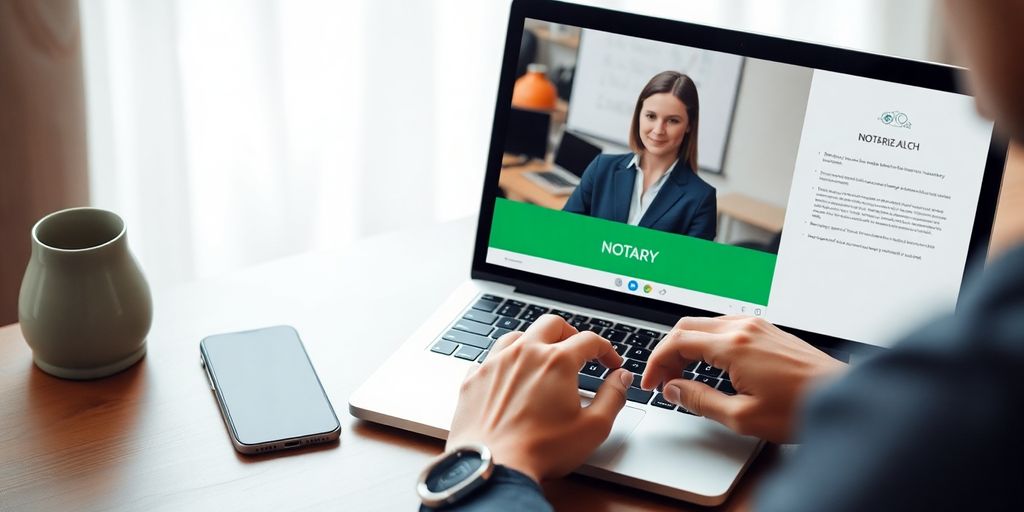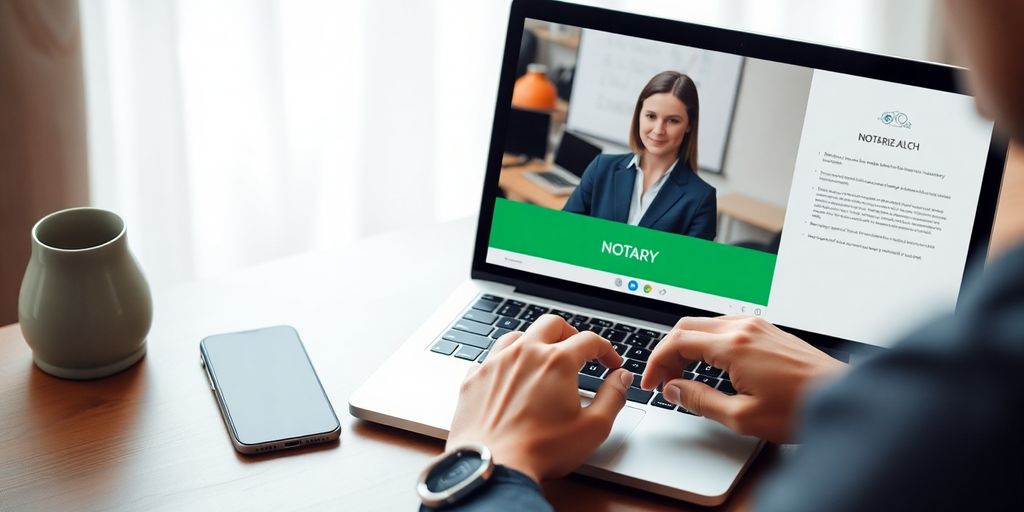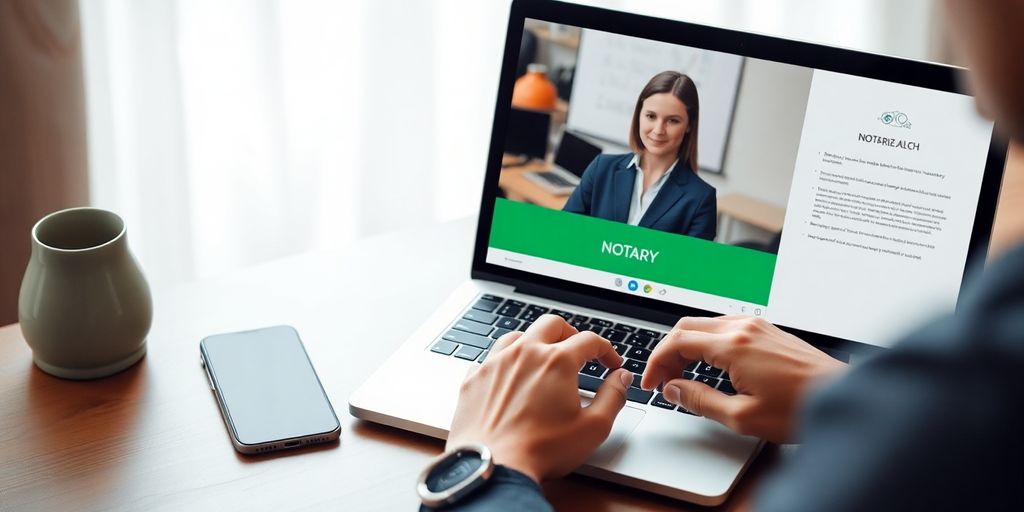Traditional Notary Alternatives: Online Notary Services

If you’ve ever needed a document notarized, you know the hassle of finding a notary. Traditional notary services often require you to travel, wait in line, and sometimes even make an appointment. But what if there was a simpler way? Enter online notary services, a modern solution that allows you to get documents notarized from the comfort of your own home. In this article, we’ll explore the ins and outs of these services, how they work, and why they might be the right choice for you.
Key Takeaways
- Online notarization is legal and valid in many states, making it a viable alternative to traditional methods.
- These services offer convenience, allowing you to notarize documents without leaving your home.
- Cost-effective options are available, often at lower prices than in-person notarization.
- Identity verification is secure, using advanced technology to ensure your documents are protected.
- User experience can vary, so it’s important to check reviews and ratings before choosing a service.
Understanding Online Notary Services

What Is Online Notarization?
Online notarization, sometimes called remote online notarization (RON), is basically getting a document notarized over the internet. Instead of meeting a notary public in person, you connect with them through a secure video call. This method uses digital tools to verify your identity and to sign and stamp your documents electronically. It’s a pretty big shift from the traditional pen-and-paper approach, and it’s becoming more and more popular.
How Does It Work?
The process is fairly straightforward. Here’s a quick rundown:
- Document Upload: You start by uploading your document to a secure platform.
- Identity Verification: The platform verifies your identity, usually through a knowledge-based assessment (KBA) and credential analysis of your ID.
- Video Conference: You connect with a notary public via video call.
- Digital Signing: You and the notary sign the document electronically.
- Notary Seal: The notary applies their digital seal and certificate.
It’s all done online, which saves a ton of time and hassle.
Benefits of Online Notary Services
There are several reasons why people are switching to online notarization:
- Convenience: You can get documents notarized from anywhere with an internet connection, 24/7.
- Speed: The process is much faster than traditional notarization.
- Accessibility: It’s great for people with mobility issues or those who live in remote areas.
- Security: Online platforms use advanced security measures to protect your documents and identity.
Online notarization offers a modern solution to a traditionally cumbersome process. It’s about making things easier and more accessible for everyone involved.
Legal Validity of Online Notarizations
State Regulations
Okay, so you’re probably wondering if online notarizations are actually legit. The short answer is: it’s complicated, but mostly yes. Most states have now passed laws that specifically allow for remote online notarization (RON). However, each state has its own set of rules and requirements. What’s okay in Florida might not fly in California, so it’s important to check the specific regulations of the state where the notarization is happening (that is, where the notary is commissioned).
Comparing Online and Traditional Notarization
Think of online notarization as just a modern version of the traditional thing. Instead of meeting face-to-face with a notary and signing a paper document, you’re doing it all online through a secure video call. The big difference is the technology involved. Online notaries use things like:
- Video conferencing to see and hear you.
- Electronic signatures to sign the document.
- Knowledge-Based Authentication (KBA) to verify your identity.
- Digital certificates to prove the notary’s identity and seal.
The legal weight is the same, assuming everything is done correctly. A properly executed online notarization should hold up in court just like a traditional one. The key is "properly executed" – meaning all the rules and regulations have to be followed.
Common Misconceptions
There are a few myths floating around about online notarizations. One big one is that they’re somehow less secure than traditional notarizations. Actually, many argue that they’re more secure because of the added layers of identity verification and the digital audit trail. Another misconception is that they’re not valid across state lines. While it’s true that state laws vary, a notarization performed legally in one state is generally recognized in others, thanks to something called the Full Faith and Credit Clause of the U.S. Constitution. But, as always, check with a legal advisor to be sure. If you are making money online, you will want to make sure your documents are properly notarized.
Choosing the Right Online Notary Service
Factors to Consider
Okay, so you’re thinking about using an online notary. Smart move! But with so many options out there, how do you pick the right one? First, think about what you need. Are you notarizing just one document, or will you need regular access? This will help you decide between pay-per-use services and subscription models. Also, check if the service is accepted in your state and the receiving party’s location.
Here’s a few things to keep in mind:
- Security: Does the platform use secure technology? Look for things like two-factor authentication and tamper-evident seals.
- Ease of Use: Is the platform easy to navigate? You don’t want to spend hours trying to figure out how to upload your documents.
- Customer Support: What kind of support do they offer? Is it available when you need it? Good customer service is a must.
Choosing the right online notary service involves balancing cost, convenience, and security. Take your time, do your research, and don’t be afraid to ask questions.
Top Online Notary Platforms
Alright, let’s talk about some of the big players. You’ve probably heard of Notarize and NotaryLive. These are popular choices, and for good reason. They both offer secure platforms and a wide range of services. FedEx Office also provides online notary services through Notarize℠, which is worth checking out if you’re already a FedEx customer.
Here’s a quick comparison:
| Platform | Pricing | Features |
| Notarize | Around $25 per document | 24/7 availability, mobile app, secure platform
The Process of Online Notarization
Online notarization might seem complex, but it’s actually a pretty straightforward process. It’s all about convenience and security, bringing the notary to you instead of the other way around. Let’s break down how it typically works.
Step-by-Step Guide
So, you’re ready to get something notarized online? Here’s what you can expect:
- Document Upload: First, you’ll need to upload the document you want to notarize to the platform. This is usually done through a secure portal on the notary service’s website.
- Identity Verification: This is a crucial step. You’ll be asked to verify your identity. This often involves uploading a copy of your government-issued ID (like a driver’s license or passport) and answering some security questions. Some platforms might also use knowledge-based authentication (KBA), where you answer questions based on public records to prove you are who you say you are.
- Connect with a Notary: Once your identity is verified, you’ll be connected with a live notary via video conference. This is where you’ll review the document together and the notary will witness your signature.
- Sign the Document: You’ll sign the document electronically, right there on the screen. The notary will then apply their electronic seal and signature.
- Download Your Notarized Document: After the notarization is complete, you can download the notarized document for your records. It’s that simple!
Required Documents
What do you need to have ready before you start? Here’s a quick rundown:
- The document needing notarization (obviously!). Make sure it’s in a format the platform accepts (usually PDF).
- A valid, government-issued photo ID. Check with the specific online notary service to see which forms of ID they accept. Common examples include driver’s licenses, passports, and state-issued ID cards.
- Your Social Security Number (SSN) may be required for identity verification purposes.
- A computer or mobile device with a webcam and microphone. You’ll need these for the video conference with the notary.
- A stable internet connection. Nobody wants the video call to drop in the middle of the notarization!
Identity Verification Methods
Identity verification is a cornerstone of online notarization. Here are some common methods used to ensure you are who you claim to be:
- Knowledge-Based Authentication (KBA): As mentioned earlier, KBA involves answering questions based on your personal history and public records. These questions are designed to be difficult for anyone but you to answer correctly.
- Credential Analysis: This involves the notary service verifying the authenticity of your government-issued ID. They might use software to check for security features and ensure the ID hasn’t been tampered with.
- Video Conference: The video conference itself is a form of identity verification. The notary can visually confirm that you are the person in the ID you provided. They can also ask you questions to further verify your identity.
It’s important to remember that online notarization services take security very seriously. They use a variety of methods to protect your personal information and ensure the notarization process is secure and legally valid. They want to make sure that the online notarization process is safe for everyone involved.
Advantages Over Traditional Notary Services

Convenience and Accessibility
Let’s be real, traditional notarization can be a pain. You have to find a notary, schedule an appointment, and then physically go to their location. Online notary services blow that out of the water. You can get your documents notarized anytime, anywhere, as long as you have an internet connection. No more rushing around during business hours or dealing with travel time. It’s especially great if you live in a rural area or have a busy schedule. Think about it: notarize from your couch in your pajamas. Can’t beat that!
Cost-Effectiveness
At first glance, the cost of online notarization might seem similar to traditional methods. However, when you factor in all the hidden costs, online options often come out ahead. Consider this:
- No travel expenses (gas, parking, etc.)
- No need to take time off work (lost wages)
- Potentially lower notary fees (depending on the service and state)
Plus, many online platforms offer document storage, which can save you money on physical storage space. It all adds up!
Enhanced Security Features
It might sound counterintuitive, but online notarization can actually be more secure than traditional notarization. Here’s why:
- Identity verification is often more rigorous, using methods like knowledge-based authentication (KBA) and video conferencing.
- Digital documents are tamper-evident, meaning any changes made after notarization are easily detectable.
- Online platforms maintain secure records of all notarizations, providing an audit trail.
- Audio-visual recordings of the notarization session are stored, adding an extra layer of security.
Think about it: no more worrying about lost or damaged paper documents. Everything is securely stored online, accessible whenever you need it.
Challenges and Limitations
Online notary services are pretty cool, but they aren’t perfect. There are definitely some things to think about before you jump in.
Technical Issues
Okay, let’s be real: tech can be a pain. Internet connection problems are probably the biggest headache. Imagine you’re in the middle of signing something super important, and then BAM, your Wi-Fi cuts out. Not fun, right? Plus, not everyone is super comfortable with using computers or smartphones. My grandma would have a really hard time with this, and I’m sure she’s not alone. Older folks, or people who just aren’t tech-savvy, might find the whole process frustrating. And then there’s the whole software compatibility thing. Will the platform work with your device? Will you need to download something special? It can be a bit of a gamble.
Legal Restrictions
This is where things get a little tricky. Not every state allows online notarization. And even if they do, the rules can be different. You might find that a document notarized online in one state isn’t accepted in another. It’s kind of a mess. Plus, some types of documents might not be eligible for online notarization at all. So, you always need to double-check the state regulations to make sure you’re not wasting your time. It’s a good idea to do your homework before you start.
User Experience Concerns
Let’s talk about the actual experience of using these services. Sometimes, it’s great. Other times, not so much. Here are some common complaints:
- The platforms can be confusing to use.
- The identity verification process can be a pain.
- Customer service can be slow or unhelpful.
It’s important to remember that online notarization is still relatively new. As the technology improves and more states adopt it, many of these issues will likely be resolved. But for now, it’s good to be aware of the potential downsides.
Also, there’s the whole security thing. Are these platforms really secure? Are your documents safe? It’s something to think about.
Future Trends in Notarization
Emerging Technologies
Notarization is on the cusp of some pretty cool changes, thanks to new tech. Think about it: blockchain could make notarized documents super secure and easy to verify. We’re also seeing more AI pop up, which could help with identity verification and fraud detection. It’s not just about making things digital; it’s about making them smarter. These technologies promise to streamline the notarization process, making it more efficient and reliable for everyone involved.
- Blockchain integration for enhanced security
- AI-powered identity verification
- Automated document review processes
Potential Legal Changes
The legal landscape around notarization is always shifting, especially with remote online notarization gaining traction. More states are likely to adopt laws that allow or expand the use of online notaries. There’s also a push for a federal standard, which would make things a lot simpler across state lines. It’s a bit of a slow process, but the trend is definitely towards greater acceptance and standardization of digital notarization.
The move towards uniformity aims to reduce confusion and ensure that notarized documents are recognized nationwide, regardless of where the notarization took place.
Market Growth Predictions
The market for online notary services is expected to grow quite a bit in the next few years. More people are realizing how convenient and cost-effective it is to notarize documents online. Plus, as technology improves and becomes more accessible, even more people will start using these services. The traditional notary world is getting a serious shakeup, and online notary platforms are leading the charge. The convenience factor is a major driver of this growth.
Here’s a quick look at projected market growth:
| Year | Projected Market Size (USD) |
|---|---|
| 2025 | $500 Million |
| 2027 | $800 Million |
| 2030 | $1.2 Billion |
Wrapping It Up
In conclusion, online notary services are changing the game for how we handle important documents. They offer a convenient way to get things notarized without the hassle of finding a local notary or scheduling appointments. You can do it all from your couch, which is a huge plus. Plus, these services are often more secure than traditional methods, thanks to advanced technology that keeps your information safe. So, whether you need to notarize a single document or multiple ones, online options are definitely worth considering. They save time, reduce stress, and make the whole process a lot easier.
Frequently Asked Questions
What is online notarization?
Online notarization is when a notary public helps you sign documents over the internet instead of in person.
Is online notarization legal?
Yes, online notarization is legal in many states. It has the same legal power as traditional notarization.
How does online notarization work?
You upload your documents, verify your identity, and then connect with a notary through video chat.
What do I need for online notarization?
You usually need a government ID, the documents you want to notarize, and a device with a camera.
Are online notary services secure?
Yes, online notary services use advanced technology to keep your documents and information safe.
Can I use online notarization for any document?
Most documents can be notarized online, but some may have specific requirements depending on state laws.








Responses